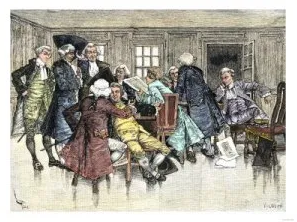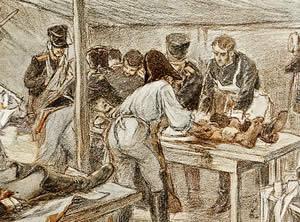April 16 — April 30, 2020
History Matters
Showing our children that their past
is prelude to their future
 The Colonies were humming along in the New World—and then—during the American Revolution–a disabling epidemic mangled the masses. The dreaded disease of that time was smallpox; it had a 30% mortality rate.
The Colonies were humming along in the New World—and then—during the American Revolution–a disabling epidemic mangled the masses. The dreaded disease of that time was smallpox; it had a 30% mortality rate.
In July of 1776, Abigail Adams wrote to her husband, John, a Founding Father, and America’s future second president, “Tis a pestilence that walketh in Darkness.”
Ironically, it was already a well-known condition. According to the Centers for Disease Control [CDC], “smallpox is thought to date back to the Egyptian Empire around the 3rd century BCE; inoculations were available by the Revolutionary War, but they worked by inducing a milder, but “still sometimes deadly” variety of it.”
Despite the dangers, John Adams had his “as a young man prior to his marriage, and long before the practice had become more acceptable in the Colonies. He had suffered greatly during his three-week recuperation in a hospital ‘with headaches, backaches, knee aches, gagging fever and eruption of pock marks’,” said historian Feather Schwartz Foster in her Presidential History Blog.
 The first known cases associated with the Revolutionary War occurred in 1775; then, it opened up–from the Atlantic to the Pacific–and within eight years–decimated the colonies, the British, the slaves, and the Native Americans; it slithered to Mexico City, and slammed Westward—to what is now Washington State.
The first known cases associated with the Revolutionary War occurred in 1775; then, it opened up–from the Atlantic to the Pacific–and within eight years–decimated the colonies, the British, the slaves, and the Native Americans; it slithered to Mexico City, and slammed Westward—to what is now Washington State.
 Historian Elizabeth Fenn, author of Pox Americana: The Great Smallpox Epidemic of 1775-82, wrote in her account of the event that “the epidemic took five times as many lives as the war did, hitting Native American populations especially hard: While the American Revolution may have defined the era for history, epidemic smallpox nevertheless defined it for many of the Americans who lived and died in that time.”
Historian Elizabeth Fenn, author of Pox Americana: The Great Smallpox Epidemic of 1775-82, wrote in her account of the event that “the epidemic took five times as many lives as the war did, hitting Native American populations especially hard: While the American Revolution may have defined the era for history, epidemic smallpox nevertheless defined it for many of the Americans who lived and died in that time.”
 Medicine was then just a primitive science, but the COVID-19 pandemic faces a fist of formidable enemies: a worldwide network of doctors, scientists and epidemiologists– with skills and access to technologies–undreamt of in the time of John and Abigail Adams, and “Pox Americana.”
Medicine was then just a primitive science, but the COVID-19 pandemic faces a fist of formidable enemies: a worldwide network of doctors, scientists and epidemiologists– with skills and access to technologies–undreamt of in the time of John and Abigail Adams, and “Pox Americana.”
The Grateful American Book Prize is an award offered for excellence in writing and storytelling of adolescent historical fiction, and non-fiction, based on the events and persons that have shaped the United States since the country’s founding.




